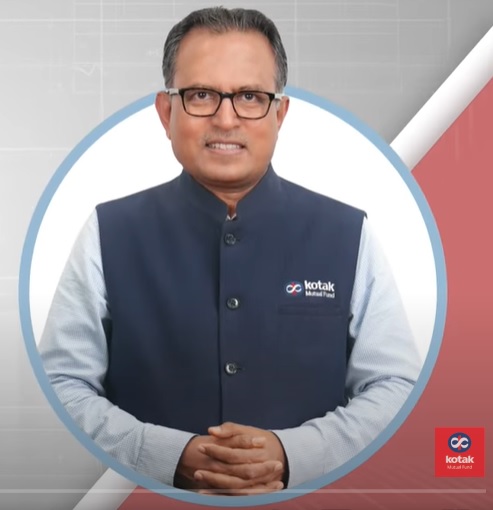Target tax reforms to boost middle-class consumption; Incentive to deposit holders; Benefits for MSMEs and industry are also expected through the PLI scheme with probably a special dispensation for the former.


Madan Sabnavis, Chief Economist, Bank of Baroda:

Pushkar Mukewar, Founder and CEO, Drip Capital

Shailesh Dhuri, CEO, Decimal Point Analytics:
FinTech BizNews Service
Mumbai, January 28: As we approach the Union Budget for FY 2025-26, here are a few insights from leading mutual fund houses, lenders and financial service providers.
Harish Krishnan, Co-CIO & Head Equity, Aditya Birla Sun Life AMC
"The shift towards supply-side reforms—through PLI schemes, corporate tax cuts, and logistics upgrade, has been the defining feature of recent budgets, laying the foundation for long-term growth. While direct demand-side interventions may be limited, targeted relief for the lower-income segments is expected. More importantly, the fiscal glide path and the RBI’s inflation credibility remain key to India’s macroeconomic standing, with S&P closely watching these markers for a potential rating upgrade. Encouraging India Inc. to re-leverage and drive fresh capex cycles will be critical in sustaining growth momentum."
Nilesh shah, MD, Kotak Mahindra AMC:
The budget is coming as the world moves from globalisation to protectionism, and tariffs are becoming an important part of the policy. The budget needs to be growth-oriented, with support for urban consumption through tax cuts, a subvention for the EMI burden at low and middle end of the pyramid, and incentives for private investment. The budget can’t afford to deviate from the path of fiscal prudence it has charted, as conservative management of the economy has differentiated us. Divestment, including strategic divestment of non-core PSUs, will help bridge the fiscal gap.
The budget needs to invest in futuristic technology and provide ample resources for Indian entrepreneurs. Indians hold massive savings in Gold, mostly in the parallel economy. I request Honourable FM to think creatively about utilising these frozen savings to raise resources for futuristic investment. That step will be truly bring Sone Pe suhaga.
Madan Sabnavis, Chief Economist, Bank of Baroda:
“We do believe that the starting point of the budget will be the fiscal deficit and efforts will be made to lower the ratio by 0.5% to probably close to 4.3-4.4% of GDP for FY26. Within this framework, the budget would work to maintain, if not increase capex, in the range of Rs 11 lakh crore that will provide a fillip to investment (the revised estimate for FY25 could be lower than what was projected). Benefits for MSMEs and industry are also expected through the PLI scheme with probably a special dispensation for the former. There could be some minor rationalisation in subsidy outgo through better targeting of beneficiaries. It would, however, be interesting to see if there are any special rebates offered on income tax given that consumption has been affected due to high inflation this year. From the perspective of banks, a more favourable tax slab for interest on bank deposits will help to provide a level field with equity markets and also provide incentive to deposit holders.”
Shailesh Dhuri, CEO, Decimal Point Analytics:
“The administration of Provident Fund remains extraordinarily archaic, and a dose of modernity is long overdue. As we approach the Budget, we hope to see reforms that simplify long-term savings and investment avenues, including rationalizing taxation on NPS, enhancing benefits for small savings schemes, and ensuring mutual fund policies foster investor confidence.”
(Decimal Point Analytics is a leading firm specializing in Data Analytics, AI, and technology-driven solutions.It provides customized analytics backed by advanced technology services, and AI-driven insights to clients worldwide.)
Pushkar Mukewar, Founder and CEO, Drip Capital:
"For the upcoming budget, policymakers should consider the evolving dynamics of domestic and global trade, which are at a pivotal crossroads. As India's infrastructure sector continues to grow, leading to a more efficient supply chain ecosystem, it becomes increasingly important to ensure that the costs of key inputs remain competitive. Therefore, the budget should focus on rationalizing import duties on scrap metal, as rising input costs directly impact infrastructure development. Lowering these taxes will help reduce overall project costs and support the growth of critical infrastructure.
Furthermore, removing import taxes on essential solar components is crucial given India's goal of producing 50% of its energy from renewable sources, with 80% expected to come from solar power. While encouraging domestic production is vital, import duties need to be recalibrated to support both domestic capacity building and the immediate need for cost-effective solar components. By taking a balanced approach, we can achieve our renewable energy goals and maintain the pace of infrastructure development.
Overall, we expect the government to lower import taxes on goods that boost local manufacturing and help the economy grow."
(Drip Capital is a leading fintech provider of cross-border trade finance)
Vijay Bharadia, Managing Partner & CIO, Wallfort PMS:
"The government capital expenditure is a key driver and the Rs1 lakh crore Capex announced in 2024 has already set a strong foundation, and we anticipate an even more ambitious outlay in the 2025 budget. Additionally, lower power supply rates would be a game-changer for the manufacturing sector, reducing production costs and boosting exports. Together, these measures could significantly strengthen India’s economic trajectory in the coming years."
Mayuresh Kini, Principal Officer, Zinc Financial Advisors:
"The current 20% TCS on overseas investments above INR 700,000 per financial year should be reduced to further enhance capital mobility while ensuring transparency. A reduction to 5% would still serve the objective of tracking financial flows without adding undue financial strain. A balanced approach will encourage Indian entrepreneurs and investors to engage more actively in global markets, contributing to long-term economic growth."
(Zinc is a SEBI-licensed Investment Advisor dedicated to transforming how Indian families save, invest, and plan for global education.)
Satish Chandra Aluri, Lemonn Markets Desk:
From Markets Perspective, the 2025 budget arrives at a critical juncture, with growth forecasts revised to four-year lows, urban demand weakening, and the INR under pressure post-Trump’s surprise victory. As this will be Prime Minister Narendra Modi’s first full budget in his third term, it must balance growth revival with fiscal discipline. Key expectations include renewed focus on infrastructure spending, export promotion via tariff rationalization and MSME support, and targeted tax reforms to boost middle-class consumption. Defence spending is likely to rise in absolute terms, with emphasis on modernization and indigenization. Priority sectors like green energy, semiconductors, and EVs may see enhanced PLI allocations of Rs30,000–40,000 crore in the coming months.”
Arun Poddar, Executive Director & CEO, Choice International:
“In the upcoming Union Budget 2025, there is a strong opportunity to prioritize financial inclusion, which remains a cornerstone of sustainable economic growth. Allocations toward initiatives like PM Jan Dhan Yojana can help improve access to financial services, particularly in rural and underserved regions.
Bridging the financial inclusion gap requires an emphasis on strengthening digital infrastructure, which holds immense potential to connect marginalized communities with essential financial tools. We also urge the government to prioritize financial literacy programs, ensuring individuals not only have access to financial services but also the knowledge to utilize them effectively.
Additionally, targeted financial support for small businesses and startups, especially in Tier 2 to Tier 6 cities, can foster economic self-reliance and unlock growth in regions that form the backbone of India’s small finance consumer base. Encouraging fintech collaboration and introducing tax incentives for digital financial services can accelerate these efforts, enabling a more inclusive and resilient economy.”
(Choice International is a prominent player in India’s financial services sector)
Arun Kumar Nayyar, MD and CEO of NeoGrowth
" The contribution of MSMEs is vital in shaping the Indian economy. With the Union Budget 2025 on the horizon, we look forward to policies that will address key challenges, such as improving access to capital, simplifying business operations, and encouraging the adoption of new technologies for MSMEs.
Tax incentives for businesses investing in technology upgrades and expanding access to capital for underserved and unserved enterprises will play a pivotal role in strengthening the MSME ecosystem. Enhanced allocations for digital public infrastructure and innovation to improve credit accessibility are also crucial to enabling sustainable growth.
The MSME sector, comprising over 50 million businesses, contributes nearly one-third of India’s annual gross value added (GVA) and employs over 216 million individuals. Insights from the NeoInsights report, 'Unlocking Generational Preferences among Indian Retailers', reveal that 77% of MSMEs are actively planning to expand their operations.
To support this ambition, strengthening initiatives under Skill India can empower the workforce with the expertise needed to adapt to a rapidly evolving business landscape, enabling MSMEs to overcome challenges and realize their growth potential, ultimately driving significant economic progress.”
(NeoGrowth is the MSME-focused digital lender ithe MSME-focused digital lender).